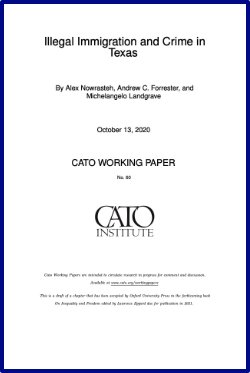By Alex Nowrasteh, Andrew C. Forrester and Michelangelo Landgrave
Donald J. Trump launched his candidacy for the Republican presidential nomination in June 2015 by comments on illegal immigrants and the crime they commit in the United States. “When Mexico sends its people, they’re not sending their best. They’re not sending you. They’re not sending you,” he said. “They’re sending people that have lots of problems and they’re bringing those problems with us. They’re bringing drugs, they’re bringing crime, they’re rapists, and some, I assume, are good people.”1 A few weeks after Trump’s announcement, 32- year-old Kate Steinle was shot and killed by an illegal immigrant Jos´e Inez Garc´ıa Z´arate in San Francisco, California. Although Z´arate was later acquitted of all murder and manslaughter charges due to mistakes made by the prosecutor, his shooting of Steinle seemed to support Trump’s worry about illegal immigrants causing a crime spree and helped win him the election in 2016. As tragic as the shooting and death of Kate Steinle was, it was one of the 13,455 murders that year in the United States and it does not tell us how many of those victims were murdered by illegal immigrants.2 The most important measure that matters when judging the crime rates of illegal immigrants is how likely they are to be criminals compared to other sub-populations. If illegal immigrants are more likely to be criminals then their presence in the United States would raise crime rates, supporting Trump’s assertions. But if illegal immigrants are less likely to commit crime then they would lower the nationwide crime rate. Politically, this debate spills over to evaluating whether domestic immigration enforcement policies reduce crime. Illegal immigrant crime is also central to the debate over sanctuary jurisdictions that refuse to turn over many illegal immigrants to Immigration and Customs Enforcement, the effects of a border wall, and whether Border Patrol requires more resources to counter crime along the border. Answering whether illegal immigrants are particularly crime prone is essential to addressing these concerns and setting efficient anti-crime policies.
Washington, DC: Cato Institute, 2020. 30p.





















